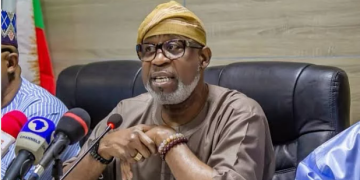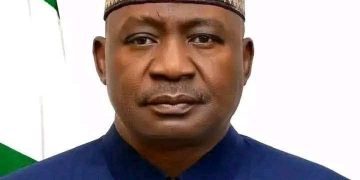The National Security Adviser, Maj.-Gen. Babagana Monguno, has disclosed that the emerging security threats to the country meant more responsibilities for his office – Office of the National Security Adviser (ONSA)
Monguno disclosed further that his office rose to the challenge with the formulation of new policies and the creation of new departments, as well as the strengthening of existing ones.
The Major General.revealed the above at the commissioning of the new ONSA and National Counterterrorism Centre (NCTC) buildings by President Muhammadu Buhari at the Three Arms Zone, Abuja.
He said in the past eight years, there have been the design or amendments of national security strategies aimed at addressing emerging and evolving security threats such as violent extremism, terrorism, cybercrime, the proliferation of small arms and light weapons, control of the use of chemical, biological, radiological, nuclear and explosives (CBRNE) related materials by non-state actors.
The NSA said the Terrorism Prevention Act (TAC), first signed into law in 2011 and amended in 2013 and 2022, as well as the National Counterterrorism Strategy (NACTEST), the Cybersecurity Policy and Strategy, the National Security Strategy and the Policy Framework and National Action Plan for Prevention and Countering Violent Extremism, have all broadened the counterterrorism responsibilities of ONSA.
He explained that the policies and strategies led to the establishment of various departments, such as the National Centre for the Control (NCTC) of Small Arms and Light Weapons; the Cybersecurity Coordination Centre; and the National Centre for the Control of Small Arms and Light Weapons. They have also led to the upgrade of existing departments, including the Intelligence Fusion Centre (IFC).
He pointed out that the ONSA was created by Decree 19 of 1986 and validated by the 1999 Constitution as the National Security Agencies Act, the same law created the Department of State Services, the Nationality Intelligence Agency (NIA) and the Defence Intelligence Agency (DIA).
“The Office, through the activities of key inter-agency intelligence-sharing platforms such as the Intelligence Community Committee, Joint Intelligence Board, General Security Appraisal Committee and the Cybercrime Advisory Council, is responsible for assessing the security concerns of the country and advises the President on all matters bordering on national security,” he said.
The NSA said one of the cardinal shifts in the approach taken by ONSA in Preventing/Countering Violent Extremism (P/CVE) was the mainstreaming of implementation in Ministries, Departments and Agencies (MDAs), while the office concentrates on its core function of coordinating efforts as stipulated by the Terrorism Prevention Act (as amended) 2022.
He added that through the ONSA, Nigeria has also been an active player in global security cooperation. From co-hosting a virtual meeting of the Global Coalition to Defeat ISIS with the United States to hosting the first-ever National Chemical Security Training Conference in collaboration with NAFDAC and the United States (U.S.) Department of States; Co-chairing (along with Switzerland) the Criminal Justice and the Rule of Law (CJ-ROL) Working Group of the Global Counterterrorism Forum (GCTF) to co-organising the First Expert Meeting of the Working Group for the development of a set of recommendations on Rule of Law-Based Administrative Measures in Counter-Terrorism Context, Nigeria is globally recognised for contributing significantly to counterterrorism policy and practice efforts.
Gen. Monguno also said that ONSA has been spearheading strong inter-agency collaboration to tackle national security threats across various to components. One such, according to him, is the facilitation of the effective tackling of some key threats within Nigeria’s maritime environment through the Falcon Eye maritime domain surveillance system.
“It is for this reason (of inter-agency collaboration) that the project (Falcon Eye) has a maritime stakeholders’ cell here in the Main Control Centre to accommodate representatives of the Nigerian Maritime Administration and Safety Agency, Nigerian Ports Authority and Marine Police, amongst others.”









































